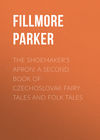Читать книгу: «The Shoemaker's Apron: A Second Book of Czechoslovak Fairy Tales and Folk Tales», страница 6
CLEVER MANKA
THE STORY OF A GIRL WHO KNEW WHAT TO SAY
CLEVER MANKA
There was once a rich farmer who was as grasping and unscrupulous as he was rich. He was always driving a hard bargain and always getting the better of his poor neighbors. One of these neighbors was a humble shepherd who in return for service was to receive from the farmer a heifer. When the time of payment came the farmer refused to give the shepherd the heifer and the shepherd was forced to lay the matter before the burgomaster.
The burgomaster, who was a young man and as yet not very experienced, listened to both sides and when he had deliberated he said:
"Instead of deciding this case, I will put a riddle to you both and the man who makes the best answer shall have the heifer. Are you agreed?"
The farmer and the shepherd accepted this proposal and the burgomaster said:
"Well then, here is my riddle: What is the swiftest thing in the world? What is the sweetest thing? What is the richest? Think out your answers and bring them to me at this same hour tomorrow."
The farmer went home in a temper.
"What kind of a burgomaster is this young fellow!" he growled. "If he had let me keep the heifer I'd have sent him a bushel of pears. But now I'm in a fair way of losing the heifer for I can't think of any answer to his foolish riddle."
"What is the matter, husband?" his wife asked.
"It's that new burgomaster. The old one would have given me the heifer without any argument, but this young man thinks to decide the case by asking us riddles."
When he told his wife what the riddle was, she cheered him greatly by telling him that she knew the answers at once.
"Why, husband," said she, "our gray mare must be the swiftest thing in the world. You know yourself nothing ever passes us on the road. As for the sweetest, did you ever taste honey any sweeter than ours? And I'm sure there's nothing richer than our chest of golden ducats that we've been laying by these forty years."
The farmer was delighted.
"You're right, wife, you're right! That heifer remains ours!"
The shepherd when he got home was downcast and sad. He had a daughter, a clever girl named Manka, who met him at the door of his cottage and asked:
"What is it, father? What did the burgomaster say?"
The shepherd sighed.
"I'm afraid I've lost the heifer. The burgomaster set us a riddle and I know I shall never guess it."
"Perhaps I can help you," Manka said. "What is it?"
So the shepherd gave her the riddle and the next day as he was setting out for the burgomaster's, Manka told him what answers to make.
When he reached the burgomaster's house, the farmer was already there rubbing his hands and beaming with self-importance.
The burgomaster again propounded the riddle and then asked the farmer his answers.
The farmer cleared his throat and with a pompous air began:
"The swiftest thing in the world? Why, my dear sir, that's my gray mare, of course, for no other horse ever passes us on the road. The sweetest? Honey from my beehives, to be sure. The richest? What can be richer than my chest of golden ducats!"
And the farmer squared his shoulders and smiled triumphantly.
"H'm," said the young burgomaster, dryly. Then he asked:
"What answers does the shepherd make?"
The shepherd bowed politely and said:
"The swiftest thing in the world is thought for thought can run any distance in the twinkling of an eye. The sweetest thing of all is sleep for when a man is tired and sad what can be sweeter? The richest thing is the earth for out of the earth come all the riches of the world."
"Good!" the burgomaster cried. "Good! The heifer goes to the shepherd!"
Later the burgomaster said to the shepherd:
"Tell me, now, who gave you those answers? I'm sure they never came out of your own head."
At first the shepherd tried not to tell, but when the burgomaster pressed him he confessed that they came from his daughter, Manka. The burgomaster, who thought he would like to make another test of Manka's cleverness, sent for ten eggs. He gave them to the shepherd and said:
"Take these eggs to Manka and tell her to have them hatched out by tomorrow and to bring me the chicks."
When the shepherd reached home and gave Manka the burgomaster's message, Manka laughed and said: "Take a handful of millet and go right back to the burgomaster. Say to him: 'My daughter sends you this millet. She says that if you plant it, grow it, and have it harvested by tomorrow, she'll bring you the ten chicks and you can feed them the ripe grain.'"
When the burgomaster heard this, he laughed heartily.
"That's a clever girl of yours," he told the shepherd. "If she's as comely as she is clever, I think I'd like to marry her. Tell her to come to see me, but she must come neither by day nor by night, neither riding nor walking, neither dressed nor undressed."
When Manka received this message she waited until the next dawn when night was gone and day not yet arrived. Then she wrapped herself in a fishnet and, throwing one leg over a goat's back and keeping one foot on the ground, she went to the burgomaster's house.
Now I ask you: did she go dressed? No, she wasn't dressed. A fishnet isn't clothing. Did she go undressed? Of course not, for wasn't she covered with a fishnet? Did she walk to the burgomaster's? No, she didn't walk for she went with one leg thrown over a goat. Then did she ride? Of course she didn't ride for wasn't she walking on one foot?
When she reached the burgomaster's house she called out:
"Here I am, Mr. Burgomaster, and I've come neither by day nor by night, neither riding nor walking, neither dressed nor undressed."
The young burgomaster was so delighted with Manka's cleverness and so pleased with her comely looks that he proposed to her at once and in a short time married her.
"But understand, my dear Manka," he said, "you are not to use that cleverness of yours at my expense. I won't have you interfering in any of my cases. In fact if ever you give advice to any one who comes to me for judgment, I'll turn you out of my house at once and send you home to your father."
All went well for a time. Manka busied herself in her house-keeping and was careful not to interfere in any of the burgomaster's cases.
Then one day two farmers came to the burgomaster to have a dispute settled. One of the farmers owned a mare which had foaled in the marketplace. The colt had run under the wagon of the other farmer and thereupon the owner of the wagon claimed the colt as his property.
The burgomaster, who was thinking of something else while the case was being presented, said carelessly:
"The man who found the colt under his wagon is, of course, the owner of the colt."
As the owner of the mare was leaving the burgomaster's house, he met Manka and stopped to tell her about the case. Manka was ashamed of her husband for making so foolish a decision and she said to the farmer:
"Come back this afternoon with a fishing net and stretch it across the dusty road. When the burgomaster sees you he will come out and ask you what you are doing. Say to him that you're catching fish. When he asks you how you can expect to catch fish in a dusty road, tell him it's just as easy for you to catch fish in a dusty road as it is for a wagon to foal. Then he'll see the injustice of his decision and have the colt returned to you. But remember one thing: you mustn't let him find out that it was I who told you to do this."
That afternoon when the burgomaster chanced to look out the window he saw a man stretching a fishnet across the dusty road. He went out to him and asked:
"What are you doing?"
"Fishing."
"Fishing in a dusty road? Are you daft?"
"Well," the man said, "it's just as easy for me to catch fish in a dusty road as it is for a wagon to foal."
Then the burgomaster recognized the man as the owner of the mare and he had to confess that what he said was true.
"Of course the colt belongs to your mare and must be returned to you. But tell me," he said, "who put you up to this? You didn't think of it yourself."
The farmer tried not to tell but the burgomaster questioned him until he found out that Manka was at the bottom of it. This made him very angry. He went into the house and called his wife.
"Manka," he said, "do you forget what I told you would happen if you went interfering in any of my cases? Home you go this very day. I don't care to hear any excuses. The matter is settled. You may take with you the one thing you like best in my house for I won't have people saying that I treated you shabbily."
Manka made no outcry.
"Very well, my dear husband, I shall do as you say: I shall go home to my father's cottage and take with me the one thing I like best in your house. But don't make me go until after supper. We have been very happy together and I should like to eat one last meal with you. Let us have no more words but be kind to each other as we've always been and then part as friends."
The burgomaster agreed to this and Manka prepared a fine supper of all the dishes of which her husband was particularly fond. The burgomaster opened his choicest wine and pledged Manka's health. Then he set to, and the supper was so good that he ate and ate and ate. And the more he ate, the more he drank until at last he grew drowsy and fell sound asleep in his chair. Then without awakening him Manka had him carried out to the wagon that was waiting to take her home to her father.
The next morning when the burgomaster opened his eyes, he found himself lying in the shepherd's cottage.
"What does this mean?" he roared out.
"Nothing, dear husband, nothing!" Manka said. "You know you told me I might take with me the one thing I liked best in your house, so of course I took you! That's all."
For a moment the burgomaster rubbed his eyes in amazement. Then he laughed loud and heartily to think how Manka had outwitted him.
"Manka," he said, "you're too clever for me. Come on, my dear, let's go home."
So they climbed back into the wagon and drove home.
The burgomaster never again scolded his wife but thereafter whenever a very difficult case came up he always said:
"I think we had better consult my wife. You know she's a very clever woman."
THE BLACKSMITH'S STOOL
THE STORY OF A MAN WHO FOUND THAT DEATH WAS NECESSARY
THE BLACKSMITH'S STOOL
A long time ago when Lord Jesus and the blessed St. Peter walked about together on earth, it happened one evening that they stopped at a blacksmith's cottage and asked for a night's lodging.
"You are welcome," the blacksmith said. "I am a poor man but whatever I have I will gladly share with you."
He threw down his hammer and led his guests into the kitchen. There he entertained them with a good supper and after they had eaten he said to them:
"I see that you are tired from your day's journey. There is my bed. Lie down on it and sleep until morning."
"And where will you sleep?" St. Peter asked.
"I? Don't think of me," the blacksmith said. "I'll go out to the barn and sleep on the straw."
The next morning he gave his guests a fine breakfast, and then sent them on their way with good wishes for their journey.
As they were leaving, St. Peter plucked Lord Jesus by the sleeve and whispered:
"Master, aren't you going to reward this man? He is poor but yet has treated us most hospitably."
Lord Jesus answered Peter:
"The reward of this world is an empty reward. I was thinking to prepare him a place in heaven. However, I will grant him something now."
Then he turned to the blacksmith and said:
"Ask what you will. Make three wishes and they will be fulfilled."
The blacksmith was overjoyed. For his first wish he said:
"I should like to live for a hundred years and always be as strong and healthy as I am this moment."
Lord Jesus said:
"Very well, that will be granted you. What is your second wish?"
The blacksmith thought for a moment. Then he said:
"I wish that I may prosper in this world and always have as much as I need. May work in my shop always be as plentiful as it is today."
"This, too, will be granted you," Lord Jesus said. "Now for your third wish."
Our blacksmith thought and thought, unable at first to decide on a third wish. At last he said:
"Grant that whoever sits on the stool where you sat last night at supper may be unable to get up until I release him."
St. Peter laughed at this, but Lord Jesus nodded and said:
"This wish, too, will be fulfilled."
So they parted, Lord Jesus and blessed St. Peter going on their way, and the blacksmith returning home to his forge.
Things came to pass as Lord Jesus had promised they should. Work in plenty flowed into the blacksmith's shop. The years went by but they made no impression on the blacksmith. He was as young as ever and as vigorous. His friends grew old and one by one died. His children grew up, married, and had children of their own. These in turn grew up. The years brought youth and maturity and old age to them all. The blacksmith alone remained unchanged.
A hundred years is a long time but at last even it runs out.
One night as the blacksmith was putting away his tools, there came a knock at the door. The blacksmith stopped his singing to call out:
"Who's there?"
"It is I, Death," a voice answered. "Open the door, blacksmith. Your time has come."
The blacksmith threw open the door.
"Welcome," he said to the woman standing there. "I'll be ready in a moment when I put away my tools." He smiled a little to himself. "Won't you sit down on this stool, dear lady, and rest you for a moment? You must be weary going to and fro over the earth."
Death, suspecting nothing, seated herself on the stool.
The blacksmith burst into a loud laugh.
"Now I have you, my lady! Stay where you are until I release you!"
Death tried to stand up but could not. She squirmed this way and that. She rattled her hollow bones. She gnashed her teeth. But do what she would she could not arise from the stool.
Chuckling and singing, the blacksmith left her there and went about his business.
But soon he found that chaining up Death had unexpected results. To begin with, he wanted at once to celebrate his escape with a feast. He had a hog which had been fattening for some time. He would slaughter this hog and chop it up into fine spicy sausages which his neighbors and friends would help him eat. The hams he would hang in the chimney to smoke.
But when he tried to slaughter the animal, the blow of his axe had no effect. He struck the hog on the head and, to be sure, it rolled over on the ground. But when he stopped to cut the throat, the creature jumped up and with a grunt went scampering off. Before the blacksmith could recover from his surprise, the hog had disappeared.
Next he tried to kill a goose. He had a fat one which he had been stuffing for the village fair.
"Since those sausages have escaped me," he said. "I'll have to be satisfied with roast goose."
But when he tried to cut the goose's throat, the knife drew no blood. In his surprise he loosened his hold and the goose slipped from his hands and went cackling off after the hog.
"What's come over things today?" the blacksmith asked himself. "It seems I'm not to have sausage or roast goose. I suppose I'll have to be satisfied with a pair of pigeons."
He went out to the pigeon-house and caught two pigeons. He put them on the chopping-block and with one mighty blow of his ax cut off both their heads.
"There!" he cried in triumph. "I've got you!"
But even as he spoke the little severed heads returned to their bodies, the heads and bodies grew together as if nothing had happened, and cooing happily the two pigeons flew away.
Then at last the truth flashed upon the blacksmith's mind. So long as he kept Death fastened to that stool, nothing could die! Of course not! So no more spicy sausages, no more smoked hams, no more roast goose – not even a broiled pigeon! The prospect was not a pleasing one, for the blacksmith loved good things to eat. But what could he do? Release Death? Never that! He would be her first victim! Well then, if he could have no fresh meat, he would have to be content to live on peas and porridge and wheaten cakes.
This actually was what he had to do and what every one else had to do when their old provisions were exhausted.
Summer passed and winter followed. Then spring came bringing new and unforeseen miseries. With the first breath of warm weather all the pests and insects of the summer before revived, for not one of them had been killed by the winter cold. And the eggs they had laid all hatched out until the earth and the air and the water swarmed with living creatures. Birds and rats and grasshoppers, insects and bugs and vermin of every kind, covered the fields and ate up every green thing. The meadows looked as if a fire had swept them clean. The orchards were stripped bare of every leaf and blossom.
Such hordes of fish and frogs and water creatures filled the lakes and the rivers that the water was polluted and it was impossible for man to drink it.
Water and land alike were swarming with living creatures not one of which could be killed. Even the air was thick with clouds of mosquitoes and gnats and flies.
Men and women walked about looking like tormented ghosts. They had no desire to live on but they had to live on for they could not die.
The blacksmith came at last to a realization of all the misery which his foolish wish was bringing upon the world.
"I see now," he said, "that God Almighty did well when He sent Death to the world. She has her work to do and I am wrong to hold her prisoner."
So he released Death from the stool and made no outcry when she put her bony fingers to his throat.
A GULLIBLE WORLD
THE STORY OF A MAN WHO DIDN'T BEAT HIS WIFE
A GULLIBLE WORLD
There was once a poor farm laborer, so poor that all he owned in the world was a hen. He told his wife to take this hen to market and sell it.
"How much shall I ask for it?" the woman wanted to know.
"Ask as much as they'll pay, of course," the laborer said.
So the woman took the hen by the feet and set out. Near the village she met a farmer.
"Good day," the farmer said. "Where are you going with that hen?"
"I'm going to market to sell it for as much as they'll pay me."
The farmer weighed the hen in his hand, pursed his lips, thought a moment, and said:
"You better sell it to me. I'll pay you three pennies for it."
"Three pennies? Are you sure that's as much as you'll pay?"
"Yes," the farmer said, "three pennies is as much as I'll pay."
So the laborer's wife sold the hen for three pennies. She went on to the village and there she bought a pretty little paper bag with one of the pennies and a piece of ribbon with another penny. She put the third penny into the bag, tied the bag with the ribbon, slipped the ribbon on a stick, put the stick over her shoulder, and then, feeling that she had done a very good day's work, she tramped home to her husband.
When the laborer heard how stupidly his wife had acted, he flew into a great rage and at first threatened to give her a sound beating.
"Was there ever such a foolish woman in the world?" he shouted angrily.
The poor woman, who by this time was snuffling and weeping, whimpered out:
"I don't see why you find so much fault with me! I'm sure I'm not the only gullible person in the world."
"Well," the laborer said, "I don't know. Perhaps there are people in the world as gullible as you. I tell you what I'll do: I'll go out and see if I can find them. If I do, I won't beat you."
So the laborer went out into the world to see if he could find any one as gullible as his wife. He traveled several days until he reached a countryside where he was unknown. Here he came to a fine castle at the window of which stood the lady of the castle looking out.
"Now then, my lady," the laborer said to himself, "we'll see how gullible you are."
He stood in the middle of the road, looked intently up at the sky, and then reaching out his arms as if he were trying to catch hold of something he began jumping up and down.
The lady of the castle watched him for a few moments and then dispatched one of her servants to ask him what he was doing. The servant hurried out and questioned him and this is the story the clever rascal made up:
"I'm trying to jump back into heaven. You see I live up there. I was wrestling up there with one of my comrades and he pitched me out and now I can't find the hole I fell through."
With his eyes popping out of his head, the servant hurried back to his mistress and repeated the laborer's story word for word.
The lady of the castle instantly sent for the laborer.
"You say you were in heaven?" she asked him.
"Yes, my lady, that's where I live and I'm going back at once."
"I have a dear son in heaven," the lady said. "Do you know him?"
"Of course I know him. The last time I saw him he was sitting far back in the chimney corner looking very sad and lonely."
"What! My son sitting far back in the chimney corner! Poor boy, he must be in need of money! My good man, will you take him something from me? I'd like to send him three hundred golden ducats and material for six fine shirts. And tell him not to be lonely as I'll come to him soon."
The laborer was delighted at the success of his yarn and he told the lady of the castle he'd gladly take with him the ducats and the fine shirting and he asked her to give them to him at once as he had to get back to heaven without delay.
The foolish woman wrapped up the shirting and counted out the money and the laborer hurried off.
Once out of sight of the castle he sat down by the roadside, stuffed the fine shirting into the legs of his trousers, and hid the ducats in his pockets. Then he stretched himself out to rest.
Meantime the lord of the castle got home and his wife at once told him the whole story and asked him if he didn't think she was fortunate to find a man who had consented to deliver to their son in heaven three hundred golden ducats and material for six fine shirts.
"What!" cried the husband. "Oh, what a gullible creature you are! Who ever heard of a man falling out of heaven! And if he were to fall, how could he climb back? The rogue has swindled you! Which way did he go?"
And without waiting to hear the poor lady's lamentations, the nobleman mounted his horse and galloped off in the direction the laborer had taken.
The laborer, who was still resting by the wayside, saw him coming and guessed who he was.
"Now, my lord, we'll try you," he said to himself.
He took off his broad-trimmed hat and put it on the ground beside him over a clod of earth.
"My good fellow," said the nobleman, "I am looking for a man with a bundle over his shoulder. Have you seen him pass this way?"
The laborer scratched his head and pretended to think.
"Yes, master," he said, "seems to me I did see a man with a bundle. He was running over there towards the woods and looking back all the time. He was a stranger to these parts. I remember now thinking to myself that he looked like one of those rogues that come from big cities to swindle honest country folk. Yes, master, that's the way he went, over there."
The laborer seemed such an honest simple fellow that at once the nobleman told him how the stranger had swindled his wife.
"Oh, the rogue!" the laborer cried. "To think of his swindling such a fine lady, too! Master, I wish I could help you. I'd take that horse of yours and go after him myself if I could. But I can't. I'm carrying a bird of great value to a gentleman who lives in the next town. I have the bird here under my hat and I daren't leave it."
The nobleman thought that as the laborer had seen the swindler he might be able to catch him. So he said:
"My good man, if I sat here and guarded your hat, would you be willing to mount my horse and follow that rascal?"
"Indeed I would, my lord, in a minute, for I can't bear to think of that rogue swindling such a fine lady as your wife. But I must beg you to be very careful of this bird. Don't put your hand under my hat or it might escape and then I should have to bear the loss of it."
The nobleman promised to be most careful of the bird and, dismounting, he handed his bridle to the laborer. That one mounted the nobleman's horse and galloped off.
It is needless to say the nobleman never saw either man or horse again. He waited and waited. At last when he could wait no longer he decided that he would have to take the bird home with him and let the laborer follow. So he lifted the edge of the hat very carefully, slipped in his hand, and clutched – the dry clod of earth!
Deeply chagrined he went home and had to bear the smiles of his people as they whispered among themselves that my lord as well as my lady had been swindled.
The laborer as he neared his cottage called out to his wife:
"It's all right, wife! You won't get that beating! I find that the world is full of people even more gullible than you!"
Покупайте книги и получайте бонусы в Литрес, Читай-городе и Буквоеде.
Участвовать в бонусной программе
















